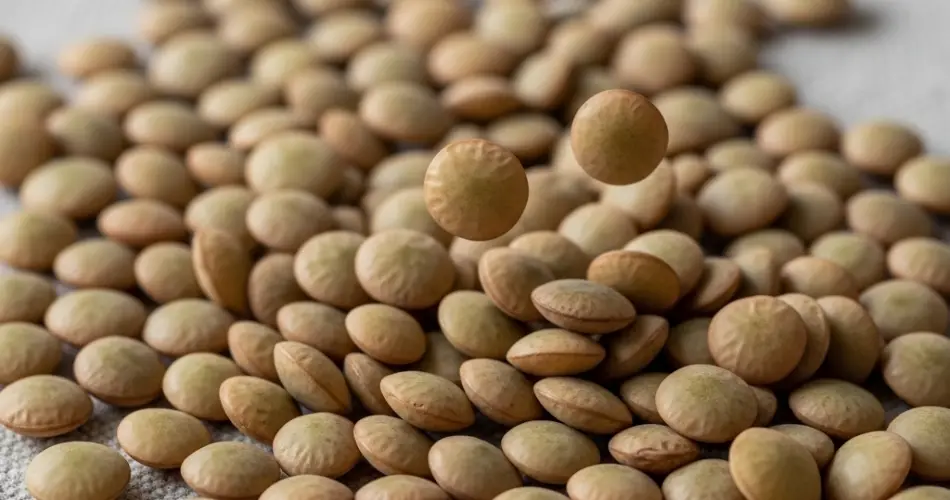When it comes to plant nutrition, nature has already provided us with incredible solutions—often right in our pantry. One of the simplest yet most effective organic fertilizers you can use is raw lentils. These humble legumes do more than provide food for humans—they’re a powerful tool for gardeners looking to improve soil quality, support root development, and boost plant health naturally.
Whether you’re gardening on a balcony, patio, backyard, or in an urban environment, this all-natural trick can make a big difference. Here’s everything you need to know about using lentils as a homemade fertilizer and root enhancer.
Why Lentils Are Good for Plants
Raw lentils are rich in essential nutrients, especially nitrogen, a critical element for plant growth. But their real magic lies in what happens when you bury them in the soil: they break down and release a variety of compounds that support root growth and improve soil structure.
What makes them especially effective is that they contain natural growth hormones, such as auxins, which stimulate root development and help plants absorb nutrients more efficiently. Lentils also promote microbial activity in the soil, which improves plant health over time.
Key Benefits of Using Raw Lentils in the Garden
-
Boosts Root Growth
Lentils encourage rapid root development in young plants and seedlings thanks to their natural hormones and nutrient profile. -
Improves Soil Fertility
As lentils decompose, they release organic matter and essential minerals that enrich the soil and make nutrients more bioavailable to plants. -
Stimulates Microbial Life
Soil-dwelling microbes feed on decomposing lentils, creating a healthy soil ecosystem that benefits plant roots. -
All-Natural and Safe
Unlike synthetic fertilizers, lentils are a non-toxic, eco-friendly option that poses no harm to pets, children, or pollinators.
How to Use Lentils as Fertilizer
There are a few simple ways to apply lentils to your plants, whether you’re working with pots, raised beds, or traditional garden soil.
Method 1: Bury Raw Lentils Near the Roots
This is the most direct and effective method for long-term benefit.
Steps:
-
Take a handful of dry, uncooked lentils (any variety works).
-
Dig a small hole 5–10 cm away from the plant stem, at a depth of about 5–7 cm.
-
Place the lentils in the hole.
-
Cover with soil and water thoroughly.
Over the next few weeks, the lentils will decompose and begin feeding the plant from below. This is ideal for tomatoes, peppers, roses, and fruiting plants.
Method 2: Use Blended Lentil Tea for Seedlings
If you’re starting seeds or have young, delicate plants, you can make a simple lentil root-boosting tea.
Steps:
-
Blend 1 tablespoon of raw lentils with 1 cup of water.
-
Strain out the solids.
-
Use the liquid to water seedlings or root cuttings.
This gives your young plants an early boost, helping them establish faster and grow stronger roots.
Method 3: Lentil Sprout Compost Booster
Sprouted lentils can also be added to compost or worked into garden beds.
How to do it:
-
Soak lentils in water for 24 hours.
-
Rinse and allow to sprout over 2–3 days.
-
Mix the sprouts into compost or dig them directly into garden soil.
Sprouted lentils break down faster and introduce even more enzymes and beneficial bacteria to the soil.
What Plants Benefit Most?
While lentils benefit almost any plant, some particularly responsive types include:
-
Tomatoes and peppers
-
Leafy greens like spinach and lettuce
-
Fruit-bearing plants such as strawberries or cucumbers
-
Roses and flowering ornamentals
-
Houseplants that need a gentle nutrient push
Avoid using lentils around plants that require low nitrogen levels, such as succulents or cacti, as they may not need the extra boost.
Precautions and Tips
-
Do not use cooked or salted lentils—only raw and unprocessed varieties are suitable for garden use.
-
Use in moderation to avoid attracting pests or rodents.
-
For containers, a small teaspoon is enough to avoid over-fertilizing.
-
Store lentils in a dry, cool place until use.
Final Thoughts
Raw lentils are more than a kitchen staple—they’re a potent, natural fertilizer that supports healthy root development and soil vitality. Whether you use them in whole form, blended as tea, or sprouted and mixed into the soil, lentils offer a sustainable and inexpensive solution to nurture your garden.
If you’re looking to reduce chemical use, improve soil health, and help your plants thrive naturally, lentils are a small change with big results.



